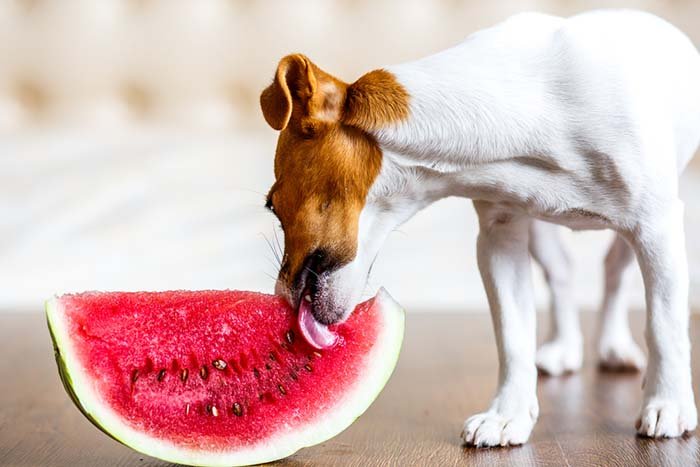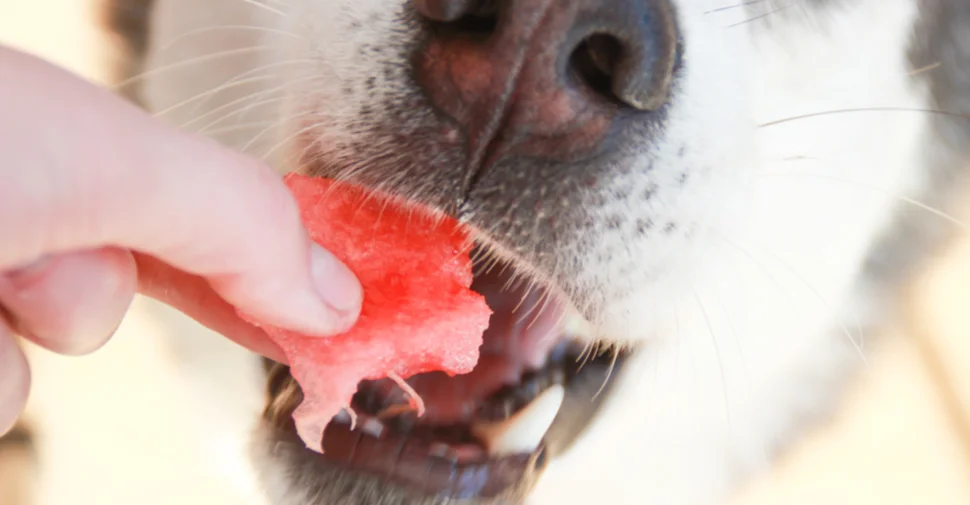Watermelon for Dogs: When the sun is high and the days are warm, nothing beats the refreshing taste of watermelon. It’s a summer staple for many, but what about our furry friends? Can dogs eat watermelon?
Table of Contents
This article delves into the safety and benefits of feeding watermelon to dogs, ensuring you’re well-informed about what treats are suitable for your canine companion. Spoiler alert: In moderation, watermelon can be a delightful treat for dogs, offering both hydration and nutrition.
The Nutritional Value of Watermelon for Dogs
Watermelon isn’t just a tasty snack; it’s packed with nutrients beneficial for dogs. Rich in vitamins A and C, as well as lycopene, watermelon can support your dog’s vision, skin, coat, and immune system. It’s also composed mostly of water, making it an excellent choice for keeping your pup hydrated on hot days. The fiber in watermelon can aid in digestion, but it’s important to serve it in moderation due to its sugar content.
| Nutrient | Amount |
|---|---|
| Calories | 50 |
| Water | 92% |
| Vitamin A | 40 mcg |
| Vitamin B6 | 0.5 mg |
| Vitamin C | 5 mcg |
| Potassium | 155 mg |
| Calcium | 10 mg |
| Fiber | 5% |
| Protein | 1 g |
This composition makes watermelon an excellent choice for dogs, especially during the summer when staying hydrated is crucial. The high water content helps maintain hydration, while the fiber aids in digestion. Vitamins A and C are antioxidants that support the immune system and skin health, and potassium is vital for nerve and muscle function.
Scenario: A Dog Benefiting from Eating Watermelon
Imagine a hot summer day where Bella, a playful Labrador, has been active in the park. She returns home, panting and a bit dehydrated. Her owner knows that while water is essential, a slice of watermelon can provide additional hydration and a nutrient boost. After removing the seeds and rind, Bella is given a few pieces of watermelon.
She enjoys the sweet treat and soon perks up, rehydrated and ready for more play. The watermelon not only quenches her thirst but also offers vitamins and minerals to support her overall well-being.
In this scenario, watermelon serves as a dual-purpose treat—keeping Bella hydrated and providing her with a nutrient-rich snack. It’s a practical and healthy way to help her cool down and recover after a day of fun and exercise.
Can Dogs Safely Eat Watermelon?
Watermelon can be a safe and enjoyable treat for dogs when given in appropriate amounts. For a small breed like a Shih Tzu, a serving size of about 1/2 cup of diced watermelon is sufficient. This amount is enough to provide them with the hydration and nutrients without overloading their system.
As for larger breeds, let’s consider a Great Dane as an example. These gentle giants can have a larger serving size due to their size. A suitable amount for an extra-large dog like a Great Dane would be between 1 to 1 1/2 cups of watermelon. It’s important to cut the watermelon into small, manageable pieces to prevent any choking hazard.
Also Read: How to Stop Dog Jumping and Biting When Excited: A Comprehensive Guide
Remember, these are general guidelines, and individual dogs may have different needs or dietary restrictions. Always introduce new foods gradually and observe your dog for any adverse reactions. And of course, remove all seeds and rind to ensure a safe snacking experience for your furry friend.
Potential Risks of Feeding Watermelon to Dogs
While watermelon provides hydration and nutrients, it also contains sugar. Excessive consumption of sugary foods can lead to obesity and diabetes in dogs. Therefore, it’s crucial to limit the amount of watermelon your dog consumes.
Choking Hazard: The Dangers of Watermelon Seeds and Rind for Dogs
It’s a sunny afternoon, and I’ve just finished sharing a juicy slice of watermelon with my German Shepherd, Max. As I turn to dispose of the rind and seeds, I realize Max has sneakily gobbled them up. My heart races—those parts of the watermelon can be dangerous for dogs!
Immediate Actions:
- Stay Calm: Dogs can sense our anxiety, so it’s important to remain composed.
- Monitor Closely: Watch for any signs of choking or distress, such as difficulty breathing, pawing at the mouth, or excessive drooling.
- No Inducing Vomiting: It’s not recommended to induce vomiting unless instructed by a vet, as this can cause additional complications.
- Contact Your Vet: If Max shows any discomfort or signs of an obstruction, I’d call the vet immediately for professional advice.
Preventive Measures:
- Education: Knowing which parts of fruits are safe for dogs is crucial. The flesh of the watermelon is fine, but the seeds and rind pose risks.
- Preparation: Always remove the seeds and rind before offering watermelon to your dog.
- Supervision: Never leave your dog unattended with food that could be harmful.
If Max Seems Fine:
- Observe Eating Habits: Ensure he continues to eat and drink normally.
- Check Bowel Movements: Look out for any changes in his stools, as seeds can cause blockages.
- Regular Check-Ups: A visit to the vet for a routine check-up can provide peace of mind.
Remember, while watermelon can be a healthy treat, it’s essential to serve it safely. Always consult with your veterinarian for personalized advice tailored to your dog’s specific needs and health. Max is more than just a pet; he’s family, and his safety is my top priority. By taking the right steps, I can ensure he enjoys his treats without any risks.
Feeding Watermelon to Dogs: Best Practices

Always remove the seeds and rind to share a watermelon with your dog safely. Cut the fruit into small, manageable pieces to prevent choking. As a rule of thumb, treats like watermelon should make up no more than 10% of your dog’s daily caloric intake.
Can Puppies Enjoy Watermelon Too?
Puppies can eat watermelon, but it’s essential to introduce any new food slowly. Puppies have delicate digestive systems, and their diets should be carefully managed to ensure they receive all the necessary nutrients for healthy growth.
Alternatives to Fresh Watermelon for Dogs
Special Considerations for Feeding Watermelon to Different Dog Breeds

Most dogs can enjoy watermelon without any issues, but some breeds may have specific dietary sensitivities or allergies. Always monitor your dog after introducing a new food and consult with your vet if you have concerns.
Signs of Watermelon Allergies in Dogs
Allergic reactions to watermelon in dogs are rare, but they can occur. Symptoms may include itching, hives, or gastrointestinal upset. If you notice any of these signs, discontinue feeding watermelon and consult your veterinarian.
In Conclusion
Watermelon can be a fantastic treat for dogs when served correctly. It’s important to prioritize moderation, proper preparation, and consideration of your dog’s individual dietary needs. By following these guidelines, you can safely add a splash of summer to your dog’s diet with this juicy fruit.
Is Seedless Watermelon a Safe Choice? Yes!
Seedless watermelon is always a super choice for your dog. The seeds are not large enough or large enough to bind in the digestive tract. You may still want to be careful about the seed material in the fruit, but if your dog loves watermelon it is a very good choice.
Can my dog eat the rind of the watermelon?
Another piece of watermelon that is not safe for your dog. Although they can stay soft on the light green part of the rind, the rind is too rough for your dog. Their digestive system does not break it down effectively and it causes intestinal obstruction just like seeds.
It is a good idea to remove the droplet and seeds before you offer the fruit to your dog.
Can my dog eat more watermelon?
Anything can cause a lot more problems and watermelon is the same.
It should be noted that 90% of any dog food is their normal nutrient-balanced dog food. Treats and watermelon are an occasional treat, and should only be 10% of your dog’s diet to prevent obesity or diabetes.
Too much watermelon can cause stomach upset, constipation or diarrhea in your dog. And small dogs should be much less of a snack than a big dogs.
What about sugar in watermelon for dogs?
Watermelon contains sugar, but high amounts of fiber act as insulation for sugar, which is released into the bloodstream more slowly than the sugar in fruits. However, if your dog has diabetes, do not give watermelon until your vet has advised you about the sizes and food needs of your dog.
What are some creative ways to give watermelon to my dog?
- By Part: Cut the watermelon into portions, remove the seeds, rinse, and then serve fresh fruit to your dog.
- Frozen: Freeze the components (seeds and rind are removed) for a cold treat on a summer day.
- Puree: Fruit puree (seeds and rind removed) and place in ice cube trays, freeze and serve as a snack.
- Doggy Ice Cream: Puree watermelon and some other dog safe fruits like blueberries, bananas or pineapple along with yogurt or peanut butter frozen in ice cube trays. Or try serving them as a smoothie!
- Dehydrated: Dehydrate the pulp (minus seeds and rind) for a chewy treat. It eliminates the hydrating properties of the fruit, but your dog will still enjoy it.
Can your dog eat watermelon? Yes, it is a healthy treat option!
Yes, watermelon is one of the best fruit choices to treat your dog. It has high moisture and fiber content, along with densely packed nutrients, keeps it in the superfood compartment.
Properly covered, it will withstand a lot of adverse conditions and will provide a quick, nutritious, and hydrating treat for your dog. Watermelon will be upset if your dog gorges on it.

